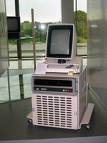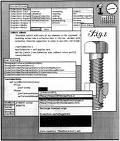Hooray! Business Week reports that:
The Association for Computing Machinery (ACM) has awarded the 2009 A.M. Turing Award to Charles P. Thacker, for his work in pioneering the networked personal computer.
In 1974, while at the Xerox PARC (Palo Alto Research Center), Thacker built a prototype of a desktop computer, called the Alto. It featured a number of innovations that have since become commonplace on PCs, including a television-like screen, a graphical user interface and a WYSIWYG (what-you-see-is-what-you-get) text editor.
“The Alto was an amazing accomplishment,” said Charles Simonyi, who worked with Thacker at PARC and contributed software to the Alto. Simonyi later went on to head up Microsoft’s application software group. “The idea was to design something for the future, when the component prices came down. And that worked perfectly: The prices did come down and the design was correct.”
In an interview with IDG, Thacker recalled that the Alto development was led both by himself — he handled the hardware side — and Butler Lampson, who developed the software. The original prototype cost US$12,000. “This was a time in which $12,000 was a lot of money,” he said.
The researchers saw the appeal immediately. Simonyi said PARC employees and associates would sneak in at night to use the Alto to carry out mundane tasks like assembling Parent-Teacher Association newsletters or writing up a Ph.D thesis. “It was the first computer used by non-computer people for their own personal ends,” he said.
The innovation was not limited to the computer itself. "We had a system. We had the computers, the network, the laser printers and the servers all hooked up together," Thacker said. “That was the real benefit in my mind, that we were able to put together an entire system.”
The award also recognizes Thacker’s work in helping develop Ethernet, as well as his early prototypes of the multiprocessor workstation and the tablet personal computer. The secret to staying innovative? “You try to hire people who are smarter than you are,” he said.
It’s difficult to over-estimate the importance of what Thacker and his colleagues created.
This was a working system in 1973! It had everything that we take for granted today. And it was what prompted Steve Jobs to develop the Apple Macintosh.


